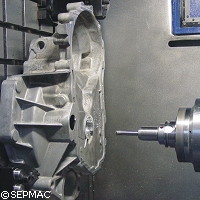EU project SEPMAC pushes the envelope
The development of a clean and safe machining process for the production of magnesium parts in the automotive sector is important for Europeans. Rising to the challenge to meet this need was the EU-funded SEPMAC ('Sustainable and economic production of magnesium components') project, funded to the tune of EUR 2.3 million. In order to get such a machining process off the ground, the SEPMAC partners focused on developing innovative hollow tools and a safe and green cutting process. For instance, SEPMAC developed a high-frequency spindle to allow 'the extraction of the magnesium dust and chips through it, and the connection of a vacuum pump to the rear side of the spindle', explained Joseba Perez Bilbatua, International Research and Development (R&D) Projects Director for IDEKO, a SEPMAC partner. 'Machining parameters were also analysed and selected according to the type of chip (serrated, needle-shaped [or] small) most appropriated to be extracted through the system tool-toolholder-spindle,' he told CORDIS News. According to Mr Bilbatua, another key objective was the development of a cutting process capable of machining magnesium in dry or near dry (i.e. Minimum Quantity Lubrication) conditions, but also maintaining the safety of the process. 'This environmentally friendly process would allow the complete recycling of the extracted chips and dust, as these would not be contaminated with neat oil, as in the traditional process,' Mr Bilbatua said. The success of the SEPMAC project will prove beneficial for industry. The project director pointed out that the main beneficiaries of this innovative machining process will be European machine tool builders and end-users from various industrial sectors. Regarding the tool builders, 'this technology will allow them to offer a totally innovative process that is not being offered by their competitors from China, Japan, Korea or the USA,' he commented. End-users include the automotive, aerospace and energy sectors, as well as furniture producers and actors from the mould-making industry. Touching on the various sectors, Mr Bilbatua noted that, for instance, 'the introduction of magnesium parts in the automotive sector will be more cost-effective and safe with this machining system' and that waste can be recycled quickly but minus the ignition or explosion hazards. Will the results obtained in SEPMAC affect the market? Mr Bilbatua told Research Headlines that a complete revolution in some sectors (magnesium, composite and graphite production) is anticipated. 'This process brings clear and cost-effective benefits in comparison with existing machining technologies,' he underlined. 'A strong effort must be made in the development of special machines, the retrofitting of existing ones, and in the production of a commercial offer of hollow tools of several diameters, materials, coatings and geometry.' Another significant factor in SEPMAC's success was the collaboration of researchers and industry actors. 'Each partner had clearly identified its role and responsibility in the development of the complete system,' he said. For instance, IDEKO, a Spain-based research and technology development (RTD) concern, was responsible for developing the machine tool, toolholder and spindle system. The German company WZL handled the machining process characterisation 'according to the types of chips and dust generated, as well as regarding the productivity, accuracy and roughness of the machined parts,' he highlighted. Due to industry's significant contribution in this line of research, IDEKO will drive similar research in the future. 'IDEKO is coordinating the Research for the Benefit of SMEs project ASPIRATE [or] "Increase of productivity, safety, greenness and cleanliness in the machining of carbon fibre reinforced composites", which is expected to start 1 June 2009 and will last for 24 months,' Mr Bilbatua noted. According to the projects director, the research in this new project will focus on the 'machining of composite materials (carbon fibre and glass fibre) for the aerospace sector using this internal chip extraction technology and validating the technology against real parts'. On another positive note, the technology centre IDEKO-IK4 clinched the overall prize 'Manufacturer of the Year 2008' in the prestigious Strategic Manufacturing Awards 2008 in Düsseldorf last October. The Manufacturer of the Year award symbolises the pinnacle in excellence in contemporary international manufacturing. The centre was also awarded first prize in the category Green Manufacturing for an innovative process aimed at safe and ecological machining of magnesium, graphite or fibre-glass/carbon composites alloys. This project research was elaborated in the frame of SEPMAC.



